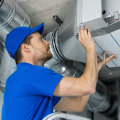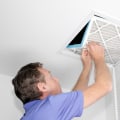It's no secret that pet dander and allergies can be a nuisance. But what type of filter do you need to keep your home free of pet allergens? The answer lies in the MERV rating. MERV stands for Minimum Efficiency Reporting Value, and it's an indicator of how well a filter works and the types of air particles it can trap. For pet dander and allergies, you'll need furnace filters rated MERV 8 to MERV 13.
These filters are capable of trapping the smallest allergens, including pet dander, which works well for allergy sufferers. MERV ratings 13 to 16 are the highest that air filters can achieve, and they have the ability to block bacteria and viruses, making them ideal for people with severe respiratory sensitivities or conditions. The MERV rating indicates the minimum efficiency of the filter, so filters with higher MERV scores can remove more particles and smaller particles from the air. A furnace filter with a MERV rating of 5 to 8 will stop fibers such as dog and cat hair. However, they won't stop the dandruff, and that's what you should be concerned about.
So, you'll want to look for a 13-16 MERV filter, as long as your furnace can support that type of filter. They can stop dander and other small debris in the air. It is not always advisable to rely solely on the boiler filter to remove pet hair and dander from the house. The first thing to consider is the MERV rating (minimum informative performance value) of the boiler filter.
MERV 11
filters are the minimum recommended for pet owners, as they are capable of filtering the smallest particles that their pets carry inside from the outside, as well as pet dander.However, remember that only a furnace filter with a MERV 8 to MERV 13 rating will effectively serve this purpose, as the latter offers superior filtration. You can review the documentation that came with your oven to determine the ideal furnace filter to purchase. When homeowners are diligent about making monthly filter changes, their HVAC systems can operate at optimal efficiency. A MERV 13 furnace filter will work perfectly without creating unnecessary airflow problems, as it filters approximately 95% of large air particles and approximately 80% of small particles. If anyone in your household has respiratory problems, it's worth paying for a HEPA air filter. When you install your oven filter properly, you help reduce the amount of airborne particles that cause pet allergies.
These air filters have an active carbon layer that attracts odorous particles and traps them inside the carbon material. MERV (minimum efficiency record value) ratings are the main classification system for air filters, and each category can filter different contaminants based on their size. The main difference between MERV 11 and MERV 13 air filters is that MERV 13 filters can also capture viruses and bacteria and are more effective for people who are allergic to pets. Commonly known as a HEPA filter, a high-efficiency particulate air filter is an excellent quality option that has passed a series of very strict standards. You'll see how often your specific filter needs to be changed, and then you can set a date and stop checking it so often.
The main function of HVAC air filters is to block harmful particles in the air at the entrance to the HVAC system. In conclusion, if you have pets in your home, it's important to choose an appropriate furnace filter with a high enough MERV rating to capture pet dander and other allergens. A MERV 8-13 rating should be sufficient for most households with pets, while those with severe respiratory sensitivities or conditions may want to opt for a higher-rated HEPA filter.



